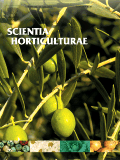
SCIENTIA HORTICULTURAE
Scope & Guideline
Fostering collaboration in the global horticultural community.
Introduction
Aims and Scopes
- Plant Physiology and Biochemistry:
Research on the physiological and biochemical processes in plants, including studies on photosynthesis, stress responses, and nutrient metabolism. - Crop Production and Management:
Innovative practices in crop cultivation, including irrigation strategies, fertilization techniques, and the use of biostimulants to enhance yield and quality. - Genetics and Breeding:
Studies focusing on genetic diversity, breeding techniques, and molecular markers for improving horticultural crops, including fruit and vegetable varieties. - Postharvest Technology:
Research on postharvest handling, storage conditions, and techniques to enhance the shelf life and quality of horticultural products. - Environmental Interactions:
Exploration of how environmental factors such as light, temperature, and water availability affect plant growth, development, and productivity. - Biotechnology and Molecular Biology:
Application of biotechnological tools for genetic modification, molecular characterization, and functional genomics in horticultural crops. - Sustainable Practices:
Research on sustainable agricultural practices, including organic farming, soil health management, and the use of eco-friendly inputs.
Trending and Emerging
- Application of Biostimulants:
Increasing interest in the use of biostimulants to enhance plant growth and stress resistance, indicating a shift towards more sustainable agriculture practices. - Climate Resilience in Crop Production:
Research focused on developing crops that can withstand extreme weather conditions and climate variability is trending, addressing the urgent need for food security. - Molecular Breeding and Genomic Selection:
There is a growing emphasis on molecular breeding techniques, including CRISPR/Cas9 and genomic selection, to enhance crop traits rapidly. - Smart Agriculture Technologies:
Integration of technologies like IoT and AI in horticulture for precision farming and monitoring plant health is emerging as a critical area of research. - Sustainable Crop Management Practices:
Research addressing sustainable practices, such as organic farming and agroecology, is gaining momentum as the global focus on sustainability intensifies. - Plant-Microbe Interactions:
Increased exploration of beneficial plant-microbe interactions, including the role of endophytes and mycorrhizae in enhancing plant health and productivity. - Health Benefits of Horticultural Products:
Research focusing on the nutritional and health-promoting aspects of fruits and vegetables is becoming more prevalent, reflecting rising consumer awareness.
Declining or Waning
- Traditional Breeding Techniques:
Research focused on conventional breeding methods is declining as molecular breeding and genetic engineering approaches gain preference for crop improvement. - Invasive Species Management:
Studies addressing invasive species in horticulture have become less frequent, possibly overshadowed by more pressing concerns related to climate change and sustainability. - Soil Fertility Management:
While still relevant, traditional soil fertility management practices are being supplanted by more integrated and sustainable approaches that consider the entire ecosystem.
Similar Journals

Erwerbs-Obstbau
Fostering Growth in the Science of Fruit Production.Erwerbs-Obstbau is a pivotal journal dedicated to the field of horticulture, focusing on research concerning the cultivation and production of fruit. Published by Springer in Germany, this journal plays a crucial role in disseminating innovative findings and advancing the knowledge base within the agricultural and biological sciences landscape. With an impact factor that places it in the Q3 category of horticultural journals, it ranks #68 out of 115 in its field according to Scopus, demonstrating its relevance and contribution to ongoing debates and advancements in horticulture practices. Researchers, professionals, and students benefit from the insights and developments shared in its pages, as the journal has been successfully converging data and insights since its inception in 1983, including continuous contributions from 1996 to the present. Although the journal currently does not offer Open Access, its comprehensive articles are invaluable for anyone invested in the science of fruit cultivation and production.
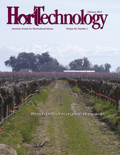
HORTTECHNOLOGY
Empowering research, enriching horticultural practices.HORTTECHNOLOGY is a premier open-access journal published by the American Society for Horticultural Science, focusing on innovative research and advancements in the field of horticulture. With an ISSN of 1063-0198 and an E-ISSN of 1943-7714, this esteemed journal has been disseminating valuable information since 1993 and continues to be a key resource with a convergence period extending to 2024. HORTTECHNOLOGY holds a reputable position in the academic community, classified in the Q2 quartile for horticulture, reflecting its significance and quality within the discipline. Its current Scopus rank places it at 49 out of 115 within Agricultural and Biological Sciences - Horticulture, positioning it in the 57th percentile. Researchers, professionals, and students alike benefit from the accessible research findings this journal offers, addressing critical challenges and advancing knowledge in horticultural practices. HORTTECHNOLOGY is committed to fostering scientific progress and open dialogue within the horticultural community, making it an invaluable resource for anyone passionate about the field.

AMERICAN JOURNAL OF POTATO RESEARCH
Empowering Researchers to Transform Potato AgricultureAMERICAN JOURNAL OF POTATO RESEARCH is a prominent scholarly journal dedicated to the field of potato research, encompassing vital areas of Agronomy and Crop Science. Published by SPRINGER, this journal holds an impactful presence in the scientific community, as evidenced by its placement in the Q2 quartile of both Agronomy and Plant Science categories for 2023. With a Scopus rank of #145 out of 406 in Agricultural and Biological Sciences, it offers a significant platform for researchers, professionals, and students alike. Covering diverse topics from cultivation techniques to pest management, the journal aims to advance understanding and innovation in potato science, facilitating the sharing of cutting-edge research and fostering collaboration among scholars. Accessible to a global audience, the journal encourages the dissemination of knowledge through its open-access options. Since its inception in 1998, the AMERICAN JOURNAL OF POTATO RESEARCH has been committed to contributing valuable insights that drive the industry forward and support sustainable agricultural practices.

Molecular Horticulture
Advancing the Future of Crop Science and Molecular BiologyMolecular Horticulture is a prestigious journal published by SpringerNature, dedicated to advancing knowledge in the fields of Agronomy, Crop Science, Horticulture, and Molecular Biology. Based in the United Kingdom, this journal, with ISSN 2730-9401, is recognized for its high-quality, peer-reviewed research and has rapidly established itself within the academic community, achieving a remarkable Q1 ranking across its relevant categories as of 2023. With a strong focus on innovative research that explores the intersection of molecular biology and horticultural science, Molecular Horticulture provides valuable insights that are essential for researchers and professionals aiming to enhance crop production and sustainability practices. As part of the Scopus database, the journal ranks impressively within its fields, holding notable positions such as Rank #7 in Horticulture and Rank #42 in Agronomy and Crop Science. While currently published through traditional access models, the journal remains accessible to a wide audience of scientists, educators, and students eager to stay informed on the latest discoveries and trends in plant science.
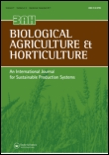
BIOLOGICAL AGRICULTURE & HORTICULTURE
Advancing sustainable practices in agriculture and horticulture.Biological Agriculture & Horticulture, published by Taylor & Francis Ltd, stands as a pivotal journal in the realms of agronomy and horticultural sciences. With an ISSN of 0144-8765 and an E-ISSN of 2165-0616, this esteemed journal has been disseminating vital research since its inception in 1982 and continues to publish leading studies through 2024. It currently boasts a commendable Q2 quartile ranking in both Agronomy and Crop Science as well as Horticulture, placing it in a prominent position within the academic community. With Scopus rankings indicating a 70th percentile in Horticulture and a 62nd percentile in Agronomy and Crop Science, the journal is a key resource for researchers, professionals, and students focused on innovative practices and scientific advancements in biological agriculture. While the journal is not open access, it remains an invaluable repository for cutting-edge research, methodologies, and reviews that push the boundaries of agricultural and horticultural sciences.
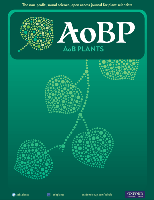
AoB Plants
Connecting researchers to cultivate knowledge.AoB Plants is a distinguished open-access journal published by Oxford University Press, dedicated to advancing the field of plant science. Since its inception in 2009, this journal has played a pivotal role in disseminating high-quality research that encompasses a wide range of topics including plant biology, ecology, and biotechnology. With an impressive impact factor and a ranking in the Q1 quartile for Plant Science, AoB Plants is recognized for its innovative contributions and scholarly rigor, ranking #129 out of 516 in the Scopus Agricultural and Biological Sciences category, placing it in the 75th percentile among its peers. By promoting open-access availability of research findings, the journal empowers researchers and practitioners alike, facilitating greater collaboration and knowledge sharing in the global scientific community. Situated in the heart of the United Kingdom, AoB Plants continues its commitment to providing a platform for pioneering research and developments in plant science, thus fostering a deeper understanding of the crucial roles that plants play in our ecosystems and economies.

Horticultural Plant Journal
Cultivating Knowledge for a Sustainable FutureThe Horticultural Plant Journal, published by KEAI PUBLISHING LTD, stands at the forefront of horticultural research and innovation. With an ISSN of 2095-9885 and an E-ISSN of 2468-0141, this open access journal has been committed to disseminating significant findings in horticulture since 2015. As of 2023, it proudly holds prestigious Q1 rankings across multiple categories, including Biochemistry, Genetics and Molecular Biology, Ecology, and Plant Science, reflecting its impactful contributions to diverse scientific fields. Located in Beijing, China, the journal not only facilitates groundbreaking studies but also provides crucial insights into sustainability and environmental issues, being ranked in the top tiers of relevant disciplines. This makes it an invaluable resource for researchers, professionals, and students who aim to stay at the cutting edge of horticultural science, offering them the latest research that informs both academic understanding and practical application.
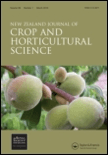
NEW ZEALAND JOURNAL OF CROP AND HORTICULTURAL SCIENCE
Pioneering Research for Tomorrow's Agricultural ChallengesThe New Zealand Journal of Crop and Horticultural Science, published by Taylor & Francis Ltd, stands as a key resource in the fields of Agronomy and Horticulture, with a commendable impact factor reflecting its quality and influence in the scientific community. Since its inception in 1989, this journal has been committed to advancing our understanding of crop development and horticultural practices, catering not only to researchers and professionals but also to students eager to delve into the intricacies of plant sciences. With a Q3 ranking in both Agronomy and Crop Science and Horticulture as of 2023, the journal occupies a significant position within the agricultural and biological sciences domain, significantly contributing to the body of knowledge in these fields. The journal features original research, reviews, and technical notes that cover a wide range of topics, ensuring a comprehensive perspective on contemporary and emerging agricultural issues. For individuals interested in accessing cutting-edge research, the journal provides subscription-based access, further enhancing its scholarly contributions.

Horticultural Science & Technology
Advancing horticultural innovation for a sustainable future.Horticultural Science & Technology is a leading journal in the field of horticulture, published by the Korean Society of Horticultural Science. With an ISSN of 1226-8763 and an E-ISSN of 2465-8588, it serves as a critical platform for disseminating cutting-edge research and advancements in horticultural science worldwide. The journal holds a prestigious Q2 category ranking in Horticulture for 2023, placing it among the top half of its field, as reflected by its Scopus rank of #56 out of 115. Operating from South Korea and backed by institutional affiliations with the National Institute of Horticultural & Herbal Science, the journal aims to promote innovative agricultural practices and sustainable horticultural techniques. Its open-access model ensures that research findings are readily available to both professionals and academics, fostering collaboration and knowledge sharing in the global horticultural community. As it continues to evolve through its converged years from 2008 to 2024, Horticultural Science & Technology remains an invaluable resource for scholars, practitioners, and students dedicated to advancing the art and science of horticulture.

HORTICULTURAL SCIENCE
Exploring the Science of Horticulture, One Study at a Time.HORTICULTURAL SCIENCE is a premier scholarly journal published by the Czech Academy Agricultural Sciences, focusing on the myriad facets of horticulture, including plant breeding, cultivation techniques, and sustainable practices. With a robust Open Access model established since 2002, it aims to disseminate high-quality research to a global audience, fostering collaboration and innovation within the field. Located in the heart of Prague, Czech Republic, the journal boasts an impressive Q2 ranking in Horticulture as reported in 2023, placing it within the top tier of its discipline. Furthermore, it ranks 52nd out of 115 in the scope of Agricultural and Biological Sciences, reflecting its growing influence and reach in horticultural research. The journal is an essential resource for researchers, professionals, and students alike, aiming to advance knowledge and practices in horticulture through original research articles, reviews, and case studies. With its commitment to academic rigor and relevance, HORTICULTURAL SCIENCE stands as a vital contribution to the ongoing discourse in horticultural studies.